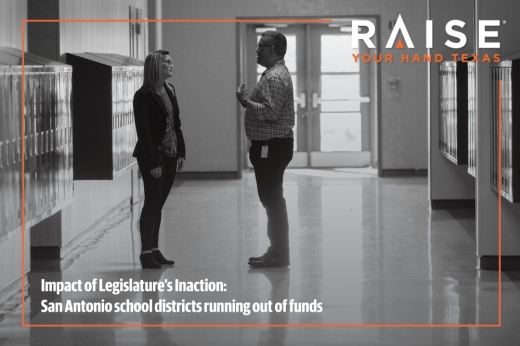While Gov. Greg Abbott is sharing news that Texas will kick off the 89th Legislative Session in January 2025 with an estimated $20 billion budget surplus, school districts across the state are running out of funds and preparing to file deficit budgets for the 2024-2025 school year.
Bob Popinski, Senior Director of Policy at Raise Your Hand Texas said districts are strapped for funding for a number of reasons, including double-digit inflation since 2019, the COVID-19 funding cliff, enrollment decline in some school districts, an increase in unfunded mandates coming out of the Capitol and inaction by the 88th Legislature.
“In a time of inflation, which every family is going through, our teachers in Texas are currently underpaid by about $7,500 compared to the national average,” Popinski said. “Texas will continue to fall behind that, so if you want to be competitive and try to attract and retain the best teachers in the state, school districts are losing that ability to do so.”
$34M deficit budget in North East ISD
North East ISD parent Genevieve Sugalski said while she isn’t privy to the exact details, she knows district staff members are working hard to prepare for the 2024-25 school year.
At the beginning of 2024, NEISD was facing a $34 million deficit budget to pay employees enough to retain them, according to a Ken5 article published Jan. 2. Sugalski said as a parent, she’s definitely noticed a financial strain on schools, especially after the height of the COVID-19 pandemic, and districts are having to chip away at extracurricular activities to provide for students’ basic educational needs.
“Art is not a separate, specialized class in our districts in our elementary schools,” Sugalski said. “They do art in the classrooms, but an actual separate art teacher is not something that the district provides anymore.”
With staffing cuts, school districts across Texas are now lacking positions such as art teachers and librarians, as districts attempt to salvage enough funding to provide students with a well-rounded education. Sugalski said she’s seen parent-teacher associations step in to offer supplemental funding for activities districts are no longer able to cover due to lack of funding from the state.
“I don’t think it’s fair that parents have to supplement, and I don’t think it’s fair that districts are having to make cuts to provide for the students’ basic needs,” Sugalski said.
Hopes for 2025 Legislative Session
In 2023, Sugalski said she felt hopeful going into the 88th legislative session knowing that there was a surplus and rainy day fund, both of which could help public schools thrive. By the end, she was so frustrated when legislators used public education funding as a bargaining chip for vouchers.
In the upcoming 89th Legislative Session that will kick off in January 2025, Sugalski said she would like to see the state fully fund Texas public schools and give Texas teachers a much-needed raise. In the meantime, she will continue fighting and asking representatives for basic school funding needs.
In addition, Sugalski said underfunded mandates continue to come out of Austin, such as new 2023 legislation requiring districts to put security guards at every school. With only $15,000 of funding per campus attached to the new mandate, it lacks the necessary funding to fully fund the position. It is going to cost school districts money in the next school year.
What’s making NEISD’s financial situation worse is an enrollment decline, which has been an issue in the district for many years due to an aggressive charter school expansion in Bexar County. San Antonio was one of the first cities impacted by charter school expansion, which had a direct negative impact on public school enrollment and, in turn, public school funding. After COVID-19, the district saw another decrease in enrollment, this time due to homeschooling.
“You can take out one student and their money, but you still have to have all the lights on in the classroom—you still have to have that teacher for the whole classroom,” Sugalski said.
How to get involved
The $19 billion in federal funding that Texas schools received to help districts address pandemic-related learning loss expire in 2024The $19 billion Texas public schools received in federal stimulus funds expire in 2024, and the current school finance formulas are not flexible enough to meet the ongoing instructional demands or inflationary cost pressures. Texas lawmakers will have a substantial amount of funding this legislative session – over $27 billion in additional general revenue and over $13.6 billion in Texas’ Rainy Day Fund. Investing in public school students should be a priority every session, because the future of Texas depends on well-funded public schools.
In the 89th Legislative Session, the Texas Legislature has the opportunity to better fund our schools and directly improve student education across the state. Our teachers need more pay, our students need more services, and Texas deserves better educational outcomes.
Sign up here to advocate for Texas public schools during the upcoming legislative session. For more information about Raise Your Hand Texas, visit raiseyourhandtexas.org.
The above story was produced by Senior Multi Platform Journalist Summer El-Shahawy with Community Impact's Storytelling team with information solely provided by the local business as part of its "sponsored content" purchase through our advertising team.
Select your community
Support Us
News
- Austin Metro
-
Houston Metro
- Houston Metro Home
- Bay Area
- Bellaire | Meyerland | West University
- Conroe | Montgomery
- Cy-Fair | Jersey Village
- Cypress
- Heights | River Oaks | Montrose
- Katy | Fulshear
- Lake Houston | Humble | Kingwood
- New Caney | Porter
- Pearland | Friendswood | Manvel
- Spring | Klein
- Sugar Land | Missouri City
- The Woodlands
- Tomball | Magnolia
- Dallas | Fort Worth Metro
- San Antonio Metro






